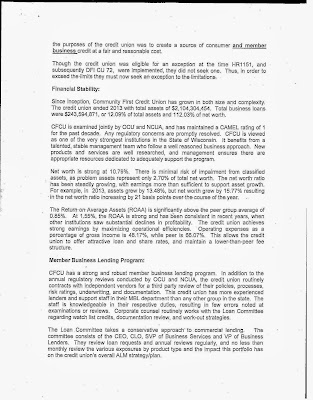Monday, April 7, 2014
Community First CU's MBL Exception
On February 26, 2014, the Wisconsin Office of Credit Unions (OCU) approved an exception to the aggregate member business loan (MBL) limit for Community First CU in Appleton, Wisconsin. OCU will now permit Community First CU to make member business loans up to 18 percent of the credit union's assets, instead of 12.25 percent of assets.
According to Wisconsin's Credit Union Regulations, credit unions can be granted an exception to the aggregate member business loan cap for three reasons.
(1) Credit unions that have a low-income designation.
(2) Credit unions that participate in the Community Development Financial Institutions program.
(3) Credit unions that are chartered for the purpose of making member business loans, as supported by documentary evidence.
Examples of supporting documentary evidence include the credit union's charter, bylaws, business plan, field of membership, board minutes and loan portfolio.
However, the field examiner cited a fourth rationale for granting an exception -- credit unions that have a history of granting member business loans -- although this is not explicitly part of the code.
The analysis by the OCU notes that the original bylaws did not include references to business loans. It was not until 2012 did the membership vote to amend its bylaws to state that the purpose of the credit union was to create a source of consumer and business credit. But amending its bylaws in 2012 should not retroactively apply to the credit unions origins in 1975.
The analyst looking at the credit union's history cites that the credit union opened its first business savings account in 1975, followed by a loan to a sole proprietor. But the analysis also notes that business lending was not an important part of the credit unions strategy until the early 1990s. However, the conclusion that business lending was an important part of the credit union's strategy seems like a stretch. Call report data from 1989 to 1998 show that member business loans ranged between a low of 2.62 percent of assets and a high of 5.33 percent of assets.
The analyst further states that the credit union was eligible for the exception at the time the Credit Union Membership Access Act (H.R. 1151) was enacted and when the state implemented its business lending regulations; but the credit union did not seek the exception.
In my personal opinion, I do not believe there is sufficient documentary evidence to to claim that Community First was eligible for an exception when HR 1151 was enacted.
Below is the analysis by the OCU along with the approval letter.
According to Wisconsin's Credit Union Regulations, credit unions can be granted an exception to the aggregate member business loan cap for three reasons.
(1) Credit unions that have a low-income designation.
(2) Credit unions that participate in the Community Development Financial Institutions program.
(3) Credit unions that are chartered for the purpose of making member business loans, as supported by documentary evidence.
Examples of supporting documentary evidence include the credit union's charter, bylaws, business plan, field of membership, board minutes and loan portfolio.
However, the field examiner cited a fourth rationale for granting an exception -- credit unions that have a history of granting member business loans -- although this is not explicitly part of the code.
The analysis by the OCU notes that the original bylaws did not include references to business loans. It was not until 2012 did the membership vote to amend its bylaws to state that the purpose of the credit union was to create a source of consumer and business credit. But amending its bylaws in 2012 should not retroactively apply to the credit unions origins in 1975.
The analyst looking at the credit union's history cites that the credit union opened its first business savings account in 1975, followed by a loan to a sole proprietor. But the analysis also notes that business lending was not an important part of the credit unions strategy until the early 1990s. However, the conclusion that business lending was an important part of the credit union's strategy seems like a stretch. Call report data from 1989 to 1998 show that member business loans ranged between a low of 2.62 percent of assets and a high of 5.33 percent of assets.
The analyst further states that the credit union was eligible for the exception at the time the Credit Union Membership Access Act (H.R. 1151) was enacted and when the state implemented its business lending regulations; but the credit union did not seek the exception.
In my personal opinion, I do not believe there is sufficient documentary evidence to to claim that Community First was eligible for an exception when HR 1151 was enacted.
Below is the analysis by the OCU along with the approval letter.
Subscribe to:
Post Comments (Atom)






No comments:
Post a Comment